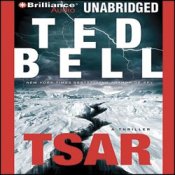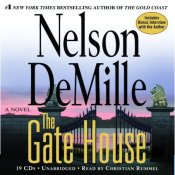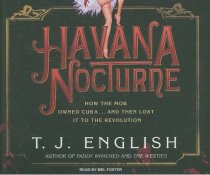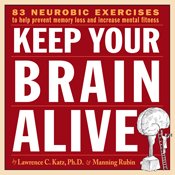December 2008
AUDIO BOOK REVIEWS
by Jonathan Lowe
 TSAR, the new suspense novel by Ted Bell, rekindles the Cold War, bringing our
international relations pot to a boil while a shadow man called The Dark Rider
attempts to reestablish control over breakaway Russian republics in a new paradigm
that may catapult him to the book's namesake role of supreme leader. First step is
to crush the European economy via oil pipeline interference. Then a bizarre plot
unfolds involving an ironic twist on the Computers-in-the-Schools theme. Bell's
hero, Alex Hawke, is worthy of Ian Fleming as a character whose proclivities
include wide ranging intrigue and beautiful women. As narrated by actor John Shea,
the plot doesn't break down or snap, even as it stretches and occasionally waffles.
Shea is such a master of understated tone and believable accents that the listener
is more than willing to suspend disbelief. (Imagine listening to a story whispered
over the backyard fence by a trusted friend who looks over his shoulder now and
then while confiding secrets.) Does the technology exist for such a trigger as
Bell postulates? By the climax it doesn't matter to the listener, who is having fun
with interesting characters (like Anastasia Korsakov) involved in a plot where
bombs, sex, Zeppelins, and a prison built over the site of a nuclear waste dump
figure prominently. (Brilliance Audio; 17 hours unabridged)</td>
TSAR, the new suspense novel by Ted Bell, rekindles the Cold War, bringing our
international relations pot to a boil while a shadow man called The Dark Rider
attempts to reestablish control over breakaway Russian republics in a new paradigm
that may catapult him to the book's namesake role of supreme leader. First step is
to crush the European economy via oil pipeline interference. Then a bizarre plot
unfolds involving an ironic twist on the Computers-in-the-Schools theme. Bell's
hero, Alex Hawke, is worthy of Ian Fleming as a character whose proclivities
include wide ranging intrigue and beautiful women. As narrated by actor John Shea,
the plot doesn't break down or snap, even as it stretches and occasionally waffles.
Shea is such a master of understated tone and believable accents that the listener
is more than willing to suspend disbelief. (Imagine listening to a story whispered
over the backyard fence by a trusted friend who looks over his shoulder now and
then while confiding secrets.) Does the technology exist for such a trigger as
Bell postulates? By the climax it doesn't matter to the listener, who is having fun
with interesting characters (like Anastasia Korsakov) involved in a plot where
bombs, sex, Zeppelins, and a prison built over the site of a nuclear waste dump
figure prominently. (Brilliance Audio; 17 hours unabridged)</td>
|
 Next, Nelson DeMille's new novel THE GATE HOUSE is a sequel to THE GOLD COAST (1990),
and concerns a tax lawyer (turned amateur sleuth) who returns to Long Island after
a long absence, where his ex wife was involved romantically with a human shark in
the form of Mafia boss Frank Bellarosa (before she killed him). (Note: you're
supposed to use a capital M in Mafia, perhaps because you might be whacked for
lack of respect otherwise.) Somehow Susan Sutter has escaped Mafia wrath,
while John Sutter, tired of all this thuggishness. takes up residence in her gate
house, and must now fend off Frank's son Anthony, who also has designs on his ex
wife. Should John whack Tony before Tony whacks him and Susan in revenge? This is
DeMille's most predictable book, only tangentially a mystery or suspense. Its
strength lies in social commentary, character development, and the sardonic wit of
the protagonist. Classical music punctuates an elegant production that showcases
both the decadent lifestyles of the super rich, and the talents of actor Christian
Rummel, whose on-target interpretation of characters and tone inspires the respect
certain other characters in the book merely demand. (Hachette Audio; 22 hours
unabridged)
Next, Nelson DeMille's new novel THE GATE HOUSE is a sequel to THE GOLD COAST (1990),
and concerns a tax lawyer (turned amateur sleuth) who returns to Long Island after
a long absence, where his ex wife was involved romantically with a human shark in
the form of Mafia boss Frank Bellarosa (before she killed him). (Note: you're
supposed to use a capital M in Mafia, perhaps because you might be whacked for
lack of respect otherwise.) Somehow Susan Sutter has escaped Mafia wrath,
while John Sutter, tired of all this thuggishness. takes up residence in her gate
house, and must now fend off Frank's son Anthony, who also has designs on his ex
wife. Should John whack Tony before Tony whacks him and Susan in revenge? This is
DeMille's most predictable book, only tangentially a mystery or suspense. Its
strength lies in social commentary, character development, and the sardonic wit of
the protagonist. Classical music punctuates an elegant production that showcases
both the decadent lifestyles of the super rich, and the talents of actor Christian
Rummel, whose on-target interpretation of characters and tone inspires the respect
certain other characters in the book merely demand. (Hachette Audio; 22 hours
unabridged) |
 Turning to non-fiction, the new biography of Samuel de Champlain (1567-1635) is
CHAMPLAIN'S DREAM by David H. Fischer. Champlain was an explorer, soldier, sailor,
and a mapmaker before he became founder of Quebec (called New France at the time).
By no means a morally superior role model, Champlain nonetheless prepared for war
while dreaming of a peaceful retreat in the New World. The book incorporates
Fischer's in-depth research into what it was like living among the Indian Nations,
who struggled to survive amid famines and rivalries near the beginning of the 17th
Century. As much an escape from our current crises as is a suspense novel like
TSAR, the book resonates with insights into the mindset of men and women far
removed from us in time, culture, and philosophy. Theater and film actor Edward
Herrmann is a great choice for it, too, since he is also well known as a
non-fiction narrator for his evocative yet controlled pacing. The go-to guy for
many previous biographies, Herrmann would make a great museum tour guide, as he
has done in documentary films in the past. The occasion for the book? The 400th
anniversary of New France. (Simon & Schuster Audio; 10 hours abridged)
Turning to non-fiction, the new biography of Samuel de Champlain (1567-1635) is
CHAMPLAIN'S DREAM by David H. Fischer. Champlain was an explorer, soldier, sailor,
and a mapmaker before he became founder of Quebec (called New France at the time).
By no means a morally superior role model, Champlain nonetheless prepared for war
while dreaming of a peaceful retreat in the New World. The book incorporates
Fischer's in-depth research into what it was like living among the Indian Nations,
who struggled to survive amid famines and rivalries near the beginning of the 17th
Century. As much an escape from our current crises as is a suspense novel like
TSAR, the book resonates with insights into the mindset of men and women far
removed from us in time, culture, and philosophy. Theater and film actor Edward
Herrmann is a great choice for it, too, since he is also well known as a
non-fiction narrator for his evocative yet controlled pacing. The go-to guy for
many previous biographies, Herrmann would make a great museum tour guide, as he
has done in documentary films in the past. The occasion for the book? The 400th
anniversary of New France. (Simon & Schuster Audio; 10 hours abridged) |
 In the decades before the 1959 Cuban revolution, the country was ruled by a
Mafia-linked despot named Fulgencio Batista. For the Mafia, it was a golden age of
power, exploitation, drugs and whores. Free to operate their casinos with impunity,
mob bosses flocked to the island to enjoy the Afro-Cuban jazz, mambo nightclubs,
and backstage sex shows. Once Frank Sinatra was interrupted from an orgy by an
autograph hound. Other American gangsters like Meyer Lansky and Santo Trafficante
hoped to make Havana their worldwide capital of operations. But then Castro arrived
on his caravan of triumph, and began a systematic dismantling of the gaming industry,
despite its impact on the economy. Tables were thrown into the street and burned,
while the mob could do little but look on and count its losses. Their attempts to
assassinate Castro failed, and so consequently the glory days faded before any
grand vision for a worldwide crime retreat could become reality. As read by
narrator Mel Foster, who unflaggingly maintains one's attention throughout,
HAVANA NOCTURNE is a fascinating tale by the author of PADDY WHACKED and THE WESTIES,
T.J. English. (Tantor Media; 13 hours unabridged)
In the decades before the 1959 Cuban revolution, the country was ruled by a
Mafia-linked despot named Fulgencio Batista. For the Mafia, it was a golden age of
power, exploitation, drugs and whores. Free to operate their casinos with impunity,
mob bosses flocked to the island to enjoy the Afro-Cuban jazz, mambo nightclubs,
and backstage sex shows. Once Frank Sinatra was interrupted from an orgy by an
autograph hound. Other American gangsters like Meyer Lansky and Santo Trafficante
hoped to make Havana their worldwide capital of operations. But then Castro arrived
on his caravan of triumph, and began a systematic dismantling of the gaming industry,
despite its impact on the economy. Tables were thrown into the street and burned,
while the mob could do little but look on and count its losses. Their attempts to
assassinate Castro failed, and so consequently the glory days faded before any
grand vision for a worldwide crime retreat could become reality. As read by
narrator Mel Foster, who unflaggingly maintains one's attention throughout,
HAVANA NOCTURNE is a fascinating tale by the author of PADDY WHACKED and THE WESTIES,
T.J. English. (Tantor Media; 13 hours unabridged) |
 Next, what is it about the brain that gets itself into a rut? According to
neurological research, the patterns we establish in daily routines create problems
for future recall of names, memories, and information processing. In their book KEEP
YOUR BRAIN ALIVE, Dr. Lawrence Katz and Manning Rubin describe neurobic exercises
which can do for the mind what aerobic exercises do for the body. On audio for the
first time, their book analyzes and describes how the brain works, then summarizes
what makes neurons decline or grow, according to inputs received through the senses.
Growth factors called neurotrophins play a role in stimulating new connections, even
in aging brains, and so the key to producing these growth factors is to present the
brain with new experiences, and to do common activities in new ways. This might
include changing hands while eating or brushing your teeth, closing your eyes and
feeling your way around the house, waking to different music, different smells.
The trick is to force change in all aspects of routine tasks in order to establish
new associations and connections, which in turn allows the mind to grow in other
ways. Turning off the TV and going outside for a walk in a new neighborhood is
also a suggestion here, which is excellent advice for couch potatoes being
brainwashed to eat more (so food industry executives can no doubt retire to
Tahiti.) As narrated by Manning Rubin, this book, together with diet and physical
exercise, might just help prevent dementia in old age as well. (Highbridge
Audio; 2 hours abridged)
Next, what is it about the brain that gets itself into a rut? According to
neurological research, the patterns we establish in daily routines create problems
for future recall of names, memories, and information processing. In their book KEEP
YOUR BRAIN ALIVE, Dr. Lawrence Katz and Manning Rubin describe neurobic exercises
which can do for the mind what aerobic exercises do for the body. On audio for the
first time, their book analyzes and describes how the brain works, then summarizes
what makes neurons decline or grow, according to inputs received through the senses.
Growth factors called neurotrophins play a role in stimulating new connections, even
in aging brains, and so the key to producing these growth factors is to present the
brain with new experiences, and to do common activities in new ways. This might
include changing hands while eating or brushing your teeth, closing your eyes and
feeling your way around the house, waking to different music, different smells.
The trick is to force change in all aspects of routine tasks in order to establish
new associations and connections, which in turn allows the mind to grow in other
ways. Turning off the TV and going outside for a walk in a new neighborhood is
also a suggestion here, which is excellent advice for couch potatoes being
brainwashed to eat more (so food industry executives can no doubt retire to
Tahiti.) As narrated by Manning Rubin, this book, together with diet and physical
exercise, might just help prevent dementia in old age as well. (Highbridge
Audio; 2 hours abridged) |
 Finally, Warren Buffett has been hailed as one of the greatest investors of all time. His
stock picks are legendary. His behind-the-scenes manipulation of corporate financial
leaders, together with his savvy for anticipating changes in commodities and services,
have made him a billionaire many times over. But who is Buffett, really? Alice
Schroeder attempts to reveal the truth in THE SNOWBALL, whose title is taken from
Buffett's idea of letting investments accumulate growth over time until they begin
to earn money automatically and exponentially. What follows is a year by year
account of how Buffett grew from a neglected child, selling bubble gum, to his
cornering of world commodity sectors. Lessons learned along the way are unveiled,
although it is doubtful anyone could repeat Buffett's experiences in today's world.
His involvement with companies from Goldman Sachs to Geico is covered, revealing
a man whose fear of speaking in public abated even as his notorious Scroogesque
stinginess continued into adulthood. Odd though, isn't it, how tightwads transform
themselves over time into the world's greatest philanthropists? Perhaps it wasn't
about the money all along, but rather the game of acquiring the most marbles or
bottle caps. The book is narrated with aplomb by actor Richard McGonagle, with a
forward read by the author about how she gained access to her subject. (Random
House Audio; 10 hours abridged)
Finally, Warren Buffett has been hailed as one of the greatest investors of all time. His
stock picks are legendary. His behind-the-scenes manipulation of corporate financial
leaders, together with his savvy for anticipating changes in commodities and services,
have made him a billionaire many times over. But who is Buffett, really? Alice
Schroeder attempts to reveal the truth in THE SNOWBALL, whose title is taken from
Buffett's idea of letting investments accumulate growth over time until they begin
to earn money automatically and exponentially. What follows is a year by year
account of how Buffett grew from a neglected child, selling bubble gum, to his
cornering of world commodity sectors. Lessons learned along the way are unveiled,
although it is doubtful anyone could repeat Buffett's experiences in today's world.
His involvement with companies from Goldman Sachs to Geico is covered, revealing
a man whose fear of speaking in public abated even as his notorious Scroogesque
stinginess continued into adulthood. Odd though, isn't it, how tightwads transform
themselves over time into the world's greatest philanthropists? Perhaps it wasn't
about the money all along, but rather the game of acquiring the most marbles or
bottle caps. The book is narrated with aplomb by actor Richard McGonagle, with a
forward read by the author about how she gained access to her subject. (Random
House Audio; 10 hours abridged) |
|